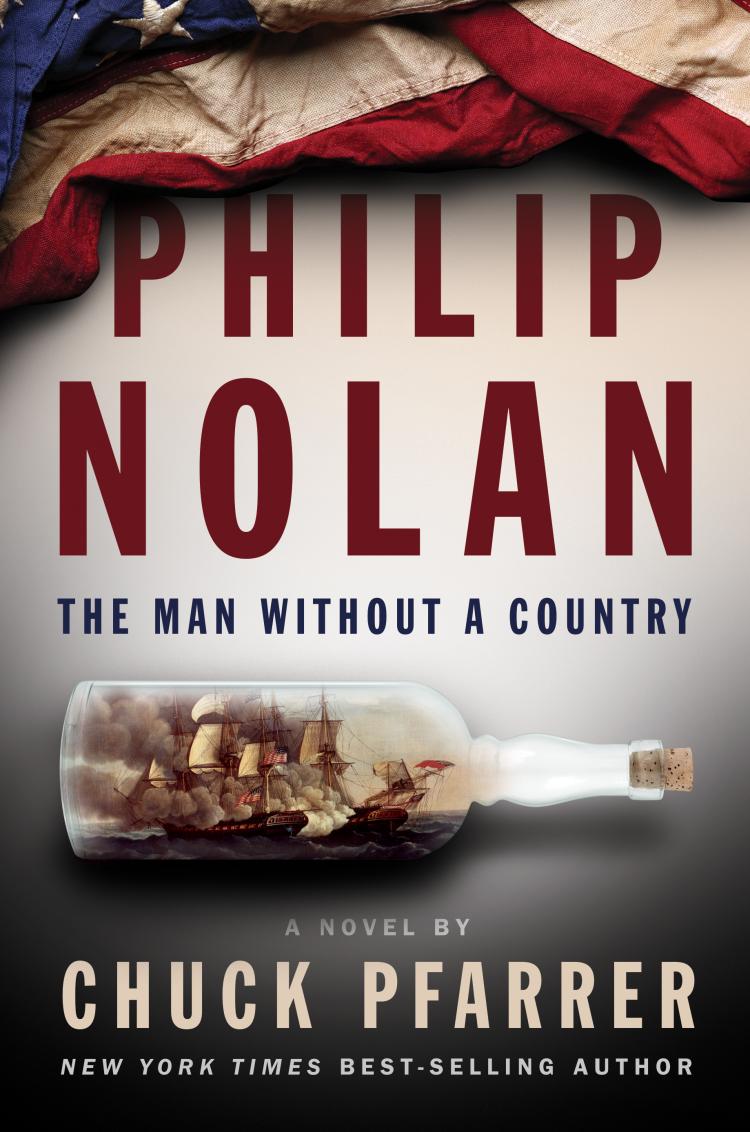Overview
Philip Nolan: The Man Without a Country is Chuck Pfarrer’s captivating adaptation of Edward Everett Hale’s American classic “The Man Without a Country,” first published in The Atlantic Monthly more than a century ago. Masterfully blending history and fiction, Pfarrer tells the story of a young artillery officer, Philip Nolan, who becomes embroiled in Aaron Burr’s 1807 conspiracy to invade the territories of the Louisiana Purchase. Insinuating his scheme has official approval, Burr convinces Nolan to carry a coded message into the Orleans Territory. Nolan has no knowledge of the former vice president’s intended treason—and Burr has no idea that Thomas Jefferson has discovered his scheme. Soon Philip Nolan is in military custody with Burr, charged an accessory to the plot.The nation holds its breath as Burr is tried for attempting to tear apart the Union. The charges against Burr seem ironclad, but his lawyers are clever, and Burr walks free. An embarrassed prosecution looks for a scapegoat, and expands the charges against Nolan to include desertion and sedition. Learning that his own court martial will proceed, despite Burr’s acquittal, Nolan denounces his accusers, damns his country, and tells the court he wishes never again to hear the words “United States” as long as he lives. The judges return with an ominous verdict: the prisoner’s wish will be granted. Nolan is sentenced to permanent exile aboard a series of U.S. warships, never again to hear news from or speak of his country.
Decades pass. Shuttled from ocean to ocean, Nolan realizes he is a stateless person, estranged from his keepers and forgotten by his country. Eventually passed aboard an American frigate in the Mediterranean, Nolan comes into the custody of a newly commissioned lieutenant, Frank Curran. When Barbary pirates capture an American whaleship, the pair is drawn into a web of international deceit and mortal danger. As a rescue mission is launched, Nolan teaches the young officer a lesson about duty, loyalty, and the meaning of patriotism.
Equal parts adventure, naval history, and morality tale, Philip Nolan: The Man Without a Country is more than frigate duels and small boat actions. Intricately plotted and beautifully crafted, the novel is a poignant and closely observed examination of the human condition.
- Format: Hardcover
- Pages: 320
pages - Published: April 15, 2016
- ISBN-10: 1591145643
- ISBN-13: 9781591145646
- Product Dimensions: 9.25 × 6.125 × 1 in
- Product Weight: 8 oz
“Hale published “The Man Without a Country” in the Atlantic Monthly in 1863 to bolster support for the Union in the North. In this first publication, Hale’s name does not appear at the beginning or end of the story, though it appears in the annual index at the end of that issue of the magazine. It was later collected in 1868 in the book The Man Without a Country, and Other Tales , published by Ticknor and Fields.
Danforth’s summary to Nolan of American history from 1807 to 1860 is an outline of the Northern case for preservation of the Union. The young country is shown standing up fearlessly to the global superpower, Great Britain; expanding to North America’s Pacific coast; developing new contributions to human knowledge such as the Smithsonian Institution; and developing new technology such as steamboats.
Hale skillfully convinced many readers that Nolan was an actual figure, thus increasing the story’s effectiveness as a piece of patriotic literature. Years later he stated that the story, at least in part, was “testimony” against the election of 1863, in which Clement Vallandigham (1820–71), an ardent antiwar, pro-Confederate, anti–”King Lincoln” Ohio Democrat, was running for office from exile in Canada, and who, at his own earlier treason trial, like the fictional Nolan, expressed his disgust the United States.
By frequently mentioning specific dates and places and by using numerous contemporary references, Hale grounded his story in a firm foundation of history and made the story seem like a record of actual events. In his 1893 and 1900 reminiscences, E. E. Hale stated, “To write the story of ‘The Man Without a Country’ and its sequel, ‘Philip Nolan’s Friends’, I had to make as careful a study as I could have the history of the acquisition of Louisiana by the United States.”
The name “Philip Nolan” belonged to the business secretary and bookkeeper for James Wilkinson, a Spanish spy who was first an associate of Aaron Burr and then an informer on Burr. That Nolan was killed by the Spanish Army while he was stealing Texas mustangs in 1801, years before Burr’s trial.”
Follow our regular channel at Spotterup on YouTube
Follow our WEBSITE
Follow on Instagram
Visit our STORE
*The views and opinions expressed on this website are solely those of the original authors and contributors. These views and opinions do not necessarily represent those of Spotter Up Magazine, the administrative staff, and/or any/all contributors to this site.

